“Squid Game: The Challenge” producers answer burning questions about the games, eliminations, and more
- Oops!Something went wrong.Please try again later.
How did they cast 456 players? What was the food like? What's up with those ink packs? Producers John Hay, Toni Ireland, and Stephen Yemoh break it all down.
WARNING: This article contains mild spoilers for Squid Game: The Challenge episodes 1-5.
From the green tracksuits to the Escher-like stairs to the childlike games themselves, the Squid Game reality show recreated everything perfectly from Netflix's buzzy Korean drama. The only thing missing? The threat of literal death, since (thankfully!) no one is actually getting murdered on Squid Game: The Challenge. But the stakes feel just as life-or-death than ever, as 456 players compete for the $4.56 million cash prize — the biggest in reality TV history.
But how did producers accurately recreate Squid Game in real life? What was it like living in that giant dorm, competing in the games, and eating the food? And who will walk away as the ultimate winner? Below, Squid Game: The Challenge executive producers John Hay, Toni Ireland, and Stephen Yemoh answer all your burning questions.
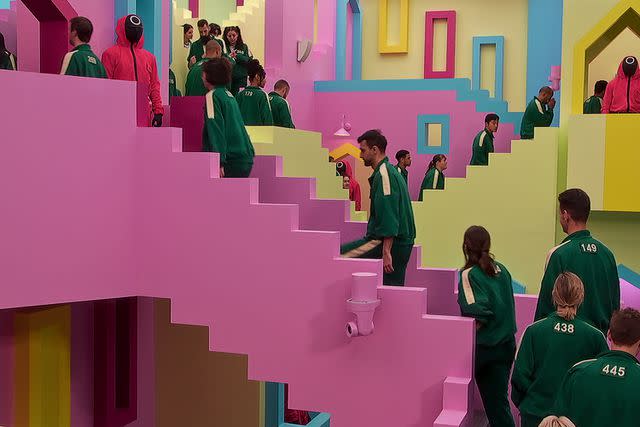
Courtesy of Netflix
Players in 'Squid Game: The Challenge'ENTERTAINMENT WEEKLY: How did you cast this show with 456 people from all around the world?
TONI IRELAND: We had three casting teams — a normal reality show would have one. We had three incredible casting directors, two in the States (one on the East coast, one on the West coast), and then we had a team in the U.K. as well who were tasked with casting U.K. and global contestants, so we had a great reach across the world.
What was the breakdown of American cast vs. international?
IRELAND: I suppose we're slightly more skewed towards American cast members, but equally we've got Brits in there and international as well. We were inviting people to apply, and then potential contestants filled in application forms online. They had to provide a video and say why they wanted to do the show, and then our casting team gave them a call, found out more about them, and saw if they were for the show.
JOHN HAY: We had over 80,000 people apply. Huge. We were looking for the same things you would in any casting, but just the whole thing was supersized to a extraordinary degree. The game is a test of human nature, so you want the widest possible variety of humans to play it and reveal themselves through the process.
IRELAND: That's something that was a real north star for us, that we had to have an inclusive cast representing people from lots of different backgrounds. And we also had no idea who was going to get through each round, so we had no idea which stories we would get to tell at any point.
HAY: Yeah, the challenge was to cast 456 people, any one of whom would've been a worthy winner. That's not anything that we ever had to do before and it was quite extraordinary.
Did everyone film confessionals? Because getting 456 interviews sounds like a massive undertaking.
IRELAND: Yeah, we did our best to make sure that everyone went through the interview room in their tracksuits. You normally have one of those rooms on a show, we had multiple to make sure we could get through as many people as possible and to get them to update us on their progress in the game and tell us their real thoughts in privacy where they could be really honest.
How much happened during a day? Give me an example of a schedule, when people woke up, what was filmed, when they went to sleep, how much downtime and sleep they had, etc?
IRELAND: Each day was slightly different because we didn't shoot a game every single day, and then some days they have tests and things like that, so it just sort of depended on that. They woke up around eight o'clock each day, exactly as you see on the show. The lights come on, the music plays, they get in line to brush their teeth, the guards came and delivered them their food.
STEPHEN YEMOH: The earlier games would have a bigger cast, so they would spend much more time in the games arena and stuff like that. As we progressed through the series, we could get through games a bit quicker, but there were sometimes quite long days depending on what was happening. Nothing too crazy, there weren't like two days without sleep or anything like that.
IRELAND: They weren't really sleep-deprived. They got a good night's sleep and they slept pretty well in the bunk beds.
HAY: This is hopefully obvious, but they lived in that set. That was part of the reason it felt so immersive. It had this incredibly powerful effect on the players when they first walked in that door of the dorm, it was like they stepped into the TV screen and then they lived within that bubble. The whole shoot was 16 days, so the finalists lived within that world for 16 days, and that was quite an intense experience.
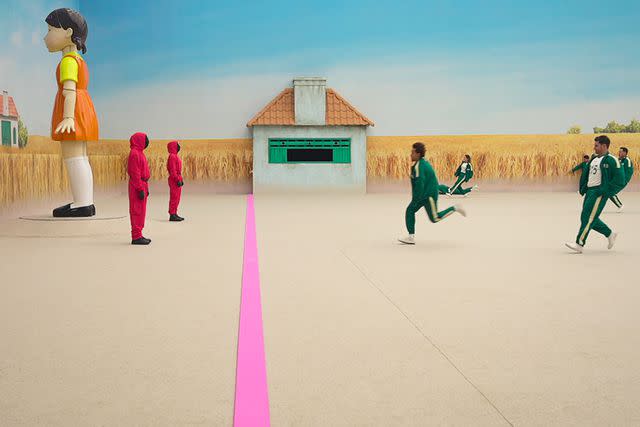
Courtesy of Netflix
Players on 'Squid Game: The Challenge' play Red Light Green LightWhat was the food like, and were they restricted to only one serving of the meals? When one player steals a second serving, I couldn’t help but worry someone had to go without food as a result ...
HAY: [Laughs] That was Lorenzo!
YEMOH: Yes, they were all told that they should take one meal. There wasn’t a case of anybody going without, but that was definitely a rule.
IRELAND: It wasn’t a free-for-all. Each of the meals were nutritionally balanced and the calories were right and everything like that, and each of the meals were slightly different, but it wasn't a luxury hotel, so the meals were just what they needed. It's quite interesting when you watch them eat, some people really are fine, they understand that they are in Squid Game and this is what they get served. Other people complained a lot more. It was all enough food for everyone to cope with, but yeah, Lorenzo did steal a bit of extra food. We couldn't actually believe that when we watched that happening. We were like, "He's not … He is!"
It was the perfect moment where a player emerged organically as a villain archetype.
HAY: It was perfect, as long as you've got them [on camera]! One of the biggest challenges was just to cover 456 players and, of course, we had no idea who our eventual heroes and prominent characters are going to be. So there was this continual process of putting the focus on people and then reassessing as you lose your heroes. The number of times we would walk back in and be like, "I can't believe they've gone, they were such a great player." But we decided to lean into that. There’s a whole precedent in dramas like Game of Thrones where you become very attached to people and they'll go suddenly, and it felt like we should run with that. Some of the people that you most thought were going to win would suddenly make an exit.
YEMOH: You have to get attached to them enough to care, but not too attached where you miss them when you lose them. That was what we looked for when we were casting: How do we potentially quite quickly care about this person, but once they're gone, you can't dwell on it?
IRELAND: And even as producers, you have no control. It all comes down to how good someone is in a game, who's going to volunteer for a test. We sat there and watched it all happen live.
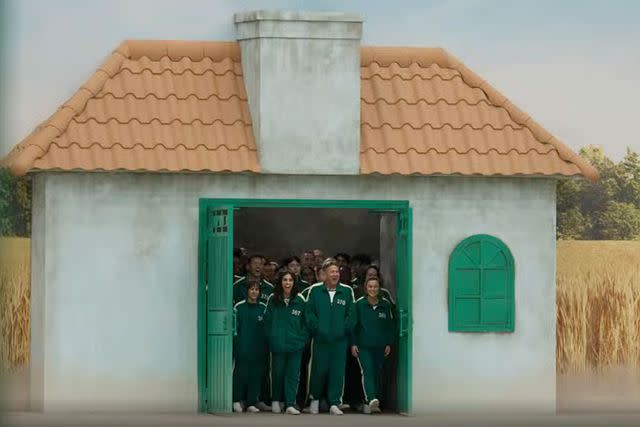
Something reality show fans notice or look for is who is getting "the winner’s edit," a.k.a. who gets shown the most onscreen or in a heroic light throughout the season so their win is ultimately satisfying. But that also makes some reality show winners predictable. With a cast this large, is that something you were thinking about as you edited each episode?
YEMOH: We knew that the chances were that we likely couldn't feature the winner from episode 1.
HAY: But maybe we have.
IRELAND: The way we tried to follow everyone was to ensure on those first couple of days when everyone was in that dorm that every player featured in a conversation. We had a list of every player to make sure that they'd featured in either a conversation or a moment or we made sure that everyone was on camera just so that we could decide in the edit if we wanted to place the winner from there, or we could make a decision and drop them in much later into the series. We had to try and ensure every day that every single player was on camera so we had options.
YEMOH: You talk about that winner's edit, it’s a really good point. Reality fans know that and we were conscious of that, and to say if we haven't got the winner's edit, so what? We are going to find a moment where we can introduce a potential winner, but not get hung up at trying to make sure they have to appear in the first few minutes. If that happens to happen, great. If it didn't, we couldn't get too hung up on it, and we just have to tell the story as it naturally progressed and what would make the most entertaining show.
IRELAND: We were conscious of people looking out for that. The beauty of Squid Game is that anything can change in a game and you can't predict anything.
HAY: That makes the show unique, because we knew that viewers were going to come to this expecting to see the big games that they'd seen from the drama, but we also knew that one of the keynotes of the drama is surprise twists, that level of shock all the way through. Getting the balance right between showing the hits and new material was a major challenge. The choices before the games are as important as the games themselves and people often make those choices without knowing the consequences. We play a lot with those pre-game choices.
IRELAND: That's one of the most exciting creative challenges for me. How do you make the choice of the shapes in Dalgona interesting? Because they know what they're walking into. If they walk into that room, no one's picking an umbrella. So that was a really great challenge to bring the pre-games in for us to make them almost mini-games in their own rights as well and reveal characteristics of the players so you can get to know them a little better.
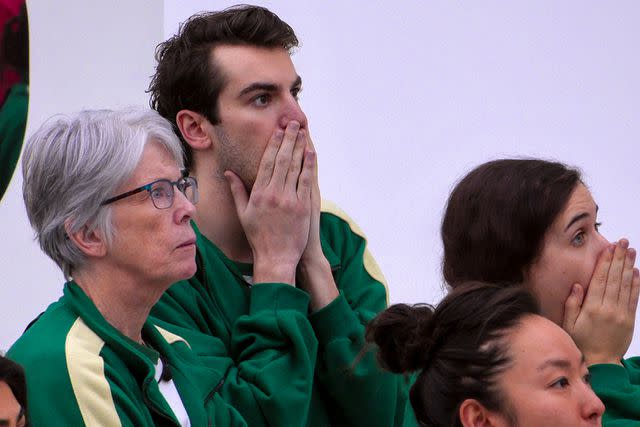
Courtesy of Netflix
Players on 'Squid Game: The Challenge'That gave us one of the stars of the early episodes, as one guy is forced to pick umbrella and almost puked ... for so long.
IRELAND: Spencer. Poor Spencer! It was one of those moments when we are watching it play out, and it happens to the first group and then I was waiting for the next decision of the next group. “They've done it again.” I was like, “Not possible. No one's made the same mistake again.” Then Spencer becomes this incredible character that we didn't know we had. He was at the front of this queue and then with everything that makes him the character that he is, his upbringing, everything is in such turmoil and it's so interesting to watch how he plays.
HAY: Spencer is also a really interesting example of a character who isn't onscreen for that long but who makes a really deep impression. We thought the challenge at the start of this was going to be how are we going to track our eventual finalists from the start? But it turns out that you don't even need to do that with Spencer, because he was so honest and so open and so likable in his interviews, he didn't need to have a huge amount of screen time for you to form quite a strong connection with him and for that to be a fascinating story.
Was Red Light, Green Light the most complicated game since it had the most players?
IRELAND: We'd like to say yes, but each game brought its own challenges. We overlooked Dalgona as just a biscuit game, but it's not. It's actually quite complicated to get the perfect biscuit recipes to play. The testing that went into it, we had about 19 different recipes.
HAY: It was recipe 19 that was successful in the end.
IRELAND: And the bake time and how far you pushed the cookie cutter in so it's fair to everybody and how you store the biscuits, it came down to them being vacuum packed and as each round of people went in, we had exactly 30 minutes from when we would open the biscuit, they'd have it in their tin, take their biscuit, sit down, start playing the games. It was exactly fair for every round of player that went in there. When you see it on screen, you don't appreciate the research and the testing that went into every game to make them as fair as possible.
YEMOH: That's the way it all starts: How do you make it fair? There's so much money at stake that you have to really make it fair first and then work backwards to work out how to film it and then work out how to make it as dramatic as possible.
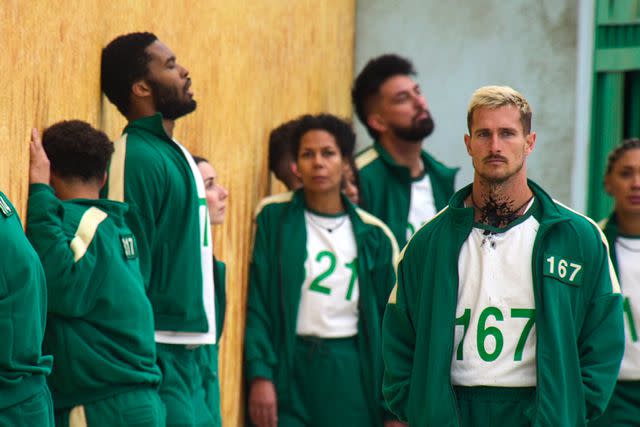
Courtesy of Netflix
Players on 'Squid Game: The Challenge'Why have ink packs explode when someone is eliminated? Were players told to dramatize their "deaths" because of that?
HAY: We talked about that a lot but for Red Light, Green Light, we had to have something that was instant. It had to be tangible, it had to feel like it belonged in the Squid Game universe, but we didn't want to pretend that people were dying. I enjoy the moments in the edit where somebody looks down at their squib and goes like, "Oh, s---." There's the enjoyable awareness about the process. The decision to in the end go with black as the color was partly a nod to squid ink, of course, but it's also signaling that we're not pretending people are dying. We're just trying to do something that is true to the game.
IRELAND: It was down to the players to decide how much they wanted to act out their elimination if they wanted to. Some people don’t have big reactions and others really go for it, and it's their moment. If they wanted to do that, that's absolutely fine by us.
YEMOH: We never told them to act in a big dramatic moment.
HAY: They were told to react however they thought was appropriate, and it was amazing watching how people interpreted that.
How is the finale/final challenge going to compare to what we saw on the scripted show?
IRELAND: I can give you a clue that they don't fight to the physical death. Other than that, I think we're probably going to keep it under wraps.
New episodes of Squid Game: The Challenge premiere Wednesdays on Netflix.
Sign up for Entertainment Weekly's free daily newsletter to get breaking TV news, exclusive first looks, recaps, reviews, interviews with your favorite stars, and more.
Related content:
Squid Game reality show producers say reports of 'inhumane' conditions were 'not accurate'
Attention all players: The Squid Game reality show is actually good
Green light! Watch the first trailer for Netflix's Squid Game reality show
Squid Game creator addresses reality spin-off: 'I know there are some concerns'
Read the original article on Entertainment Weekly.

